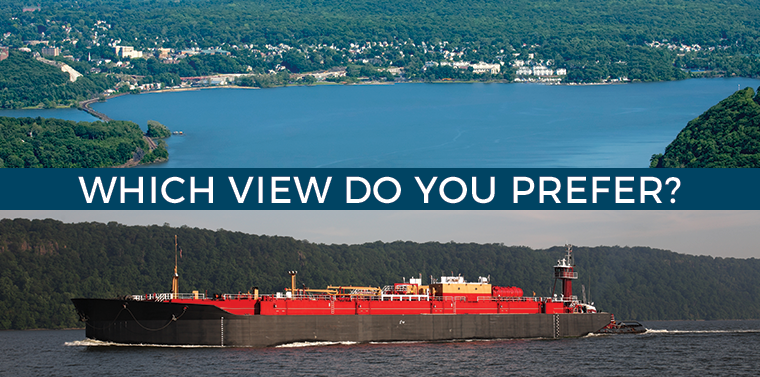Environmental Policy Clinic Fights Against Coast Guard Proposal
Pace’s Environmental Policy Clinic is petitioning a proposal by the United States Coast Guard docket number USCG- 2016-0132, for a rule to place anchorages along Hudson River.
Should the Coast Guard’s Advanced Notice of Proposed Rulemaking (ANPR) proposal go through, the shipping industry will add 43 anchorages to 10 locations on the Hudson River between Yonkers and Kingston in order to store oil until the price rises.
The Clinic wrote a letter to Coast Guard Admiral Paul Zukunft expressing their grievances with the proposal.
“The students sent a letter that basically said ‘here are the ways you guys basically [ignored] your own procedures and because of that you should withdraw the proposal and start all over,’” Director of Pace Academy for Applied Environmental Studies Michelle Land said.
The Coast Guard violated their own procedures, according to the Clinic.
According to the Coast Guard’s Waterways Management: Anchorage Management Tactics, Techniques, and Procedures (TTP) (CGTTP 3-71.2 July 2015) (WWM) document they are supposed to seek feedback from the community they are affecting and conduct studies to gauge the impact the anchorages will have on the environment, which they did not do.
“We looked at each other and said ‘wait a second, [the Coast Guard] didn’t do any of this.’ The public wasn’t aware of this was going to happen, they just published it,” Clinic student Christina Thomas said. “So essentially by doing that they prevented any outreach to the public because if they did talk to anybody they have to make it public, and they had to publish everything they were talking about. It pretty much prevented them from working with the public.”
The Clinic also fears that the anchorages will pose a threat to the health of the Hudson River Valley by putting it at risk for an oil spill and destroying wildlife homes through damage done to the seafloor by anchors.
“The risk of an oil spill in addition to the ecological damage done by the barges themselves is what makes the Coastguard proposal dangerous for all those interested in the health of the Hudson River Valley,” Clinic student Lee Allen said.
The Clinic presented the petition and asked the Coast Guard to withdraw the proposal at a press conference alongside New York State senators Terrence Murphy, Sue Serino, and David Carlucci, and Westchester County Executive Rob Astorino on Dec. 5.
“How embarrassing is it that it took students from Pace University, to shame, expose, and embarrass the federal government on a situation like this,” Astorino said.
The proposal is unpopular with the local residents and it has been difficult for lawmakers to get in contact with the Coast Guard over this issue, according to Land. The Coast Guard’s federal notice about this proposal received 10,206 comments on regulations.gov before being closed.
The Coast Guard’s federal notice about this proposal received 10,206 comments on regulations.gov before being closed.
“All the communities along the Hutson are totally against it, even Bedford, which isn’t even a Hudson River town signed a resolution against it, the county government is against it, nobody wants it,” Land said.
Coast Guard Spokeswoman Chief Petty Officer Allyson Conroy disagreed with the Clinic’s assertion and said that if the proposal moves forward the Coast Guard will hold public meetings to gather feedback in 2017, according to Northeast Public Radio.
“If indeed there is an actual proposed rule, once that rule is going to be proposed, an environmental impact study will be conducted,” Conroy said. “And that is all part of the process of proposing any sort of rule.”
Thomas said that the petition was well received by residents who have had issues with the anchorages but had no backing to oppose them until being informed that the Coast Guard didn’t follow protocol.
“What this letter did was make sure that these citizens know that not only are these anchorages going to be hideous to look at, not only is the Coast Guard not reaching out to them, but the Coast Guard actually circumvented its own process, it didn’t follow its rules word for word, which gives more strength to their argument that they want the Coast Guard to stop the process and re-engage the public,” Thomas said.
Your donation supports independent, student-run journalism at Pace University. Support the Pace Chronicle to help cover publishing costs.

